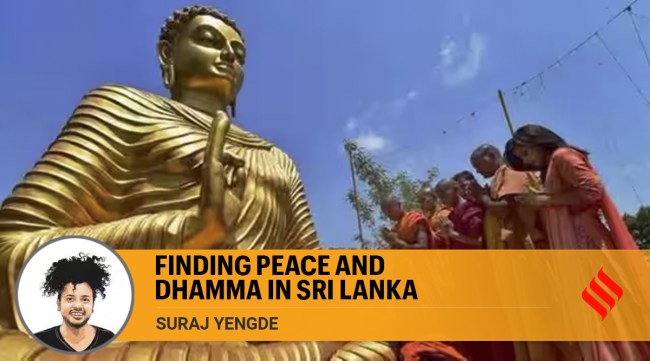Opinion Finding peace and Dhamma in Sri Lanka
Like Indians, Sri Lankans seem to be cognisant of the many invasions that happened in South India and how Hinduism was brought in to challenge Buddhism. They also faced the desecration of their sacred sites in the past and during the civil war.
 The common roots for all are the shrines of Buddhist reverence present across Sri Lanka and Tamil Nadu. (File Photo)
The common roots for all are the shrines of Buddhist reverence present across Sri Lanka and Tamil Nadu. (File Photo)
As many of you may know by now, I have been on a trip to the places where Buddha’s Dhamma has originated, made an impact or is preserved and worshipped. In India, I spent days exploring the caves in the Western Ghats, in Bihar, and in Lumbini. But what I experienced in the past 10 days in Sri Lanka was stupendously surprising. I had heard about Sri Lanka through the stories of Samrat Ashok and Sri Lankan monks who visited Nanded and nearby places preaching the word of Lord Buddha. Sri Lanka also featured as a nation of cricketing geniuses. But nothing prepared me for the cleanliness on the streets, beaches, and religious sites, and the kindness in hearts that is indoctrinated into the life of Sri Lankans. They are poor people but prideful and honourable.
I have not travelled extensively through the nooks and corners and certainly cannot validate the many political and internal matters of the country. But whatever I experienced left me with a feeling of pleasant disbelief. Can people be so kind without reason? Is there a certain unsaid expectation?
I was always on guard for potential scamsters and about 90 per cent of the time, I was proved wrong. I am used to regular businesspeople, taxis, auto drivers – pretty much anyone in the industry affiliated with serving tourists – as scamsters. Not that such was absent in Sri Lanka, but people here dealt with grace.
They did not impose by invading my privacy and making me uncomfortable. As soon as I landed in Colombo, beautiful smiling faces greeted me. But I was still unsure if this was a gesture or part of the job.
Everywhere I went, the Sri Lankans welcomed me. After realising that I was Indian and not Sinhalese, the signature smile extended. They were even happier to know that I had a Buddhist background.
It has become their lifestyle even without having to think as a deliberate act. However, one Thero pointed out that this belief is devotional but not philosophical.
The sites where relics of the Buddha remain are the ones that are most revered.
Like Indians, Sri Lankans seem to be cognisant of the many invasions that happened in South India and how Hinduism was brought in to challenge Buddhism. They also faced the desecration of their sacred sites in the past and during the civil war. The history is visible in the ruins. But they did not hold contempt.
Despite the chequered role of India in their civil war, they did not hold that against me. The civil war was another of the grotesque episodes witnessed in countries with a colonial past across Asia, Africa and Latin America.
The force of colonial powers, partnered with Brahmins and the dogma of ancient histories, culminated in the creation of a violent reaction. The majority-minority question has degraded most societies. Sri Lanka is no exception.
The political elite formed a ruthless ideology based on sentiments of regionalism and nationalism by savaging poor and vulnerable everyday, regular people. The story of Sri Lanka’s recent past is a testimony to this violent humanitarian crisis.
The common roots for all are the shrines of Buddhist reverence present across Sri Lanka and Tamil Nadu. The greatest Tamil Buddhist of the modern era, Iyothee Thass, also received ordination in the neighbouring island.
I wondered what was the reason for the generosity, donation, kindness, and happiness among Sri Lankans. I couldn’t help but think about the immense influence of Dhamma in the life of the people. It has become their lifestyle even without having to think of it as a deliberate act.
Certainly, I was told that certain sections of monkhood were corruptible and how robed men act to draw political power. Such pontiffs are the bane of society elsewhere in the world too.
This was a trip to the Dhamma land, which Indian Buddhists of the 4th century BCE chose as one that would preserve Buddha’s relics and uphold Buddha’s Dhamma. Samrat Ashok had sent his two precious children – Mahindra and Sanghmitra – to the land to spread Dhamma. I almost choked with emotion when I saw the place where Theri (nun) Sanghmitra stayed and the site of her cremation, where devotees now offered their prayers.
We bring back this great history by reviving, popularising, and claiming Samrat Ashoka as one of our own. Starting September 30, the Buddhist Fraternity Council is carrying out the “Ashoka-Ambedkar Dhamma Yathra” through six states. The statue of Ashoka and a unique copy of the Buddha and His Dhamma authored by Dr Ambedkar will be gifted to viharas and devotees on the way to Nagpur.
One Thero (monk) pointed out that we have to know the “right Buddhism” and bring it into our lives. It must be the way out of our current dystopia and inequality.
(Suraj Yengde, author of Caste Matters, curates Dalitality and is currently at Oxford University)






